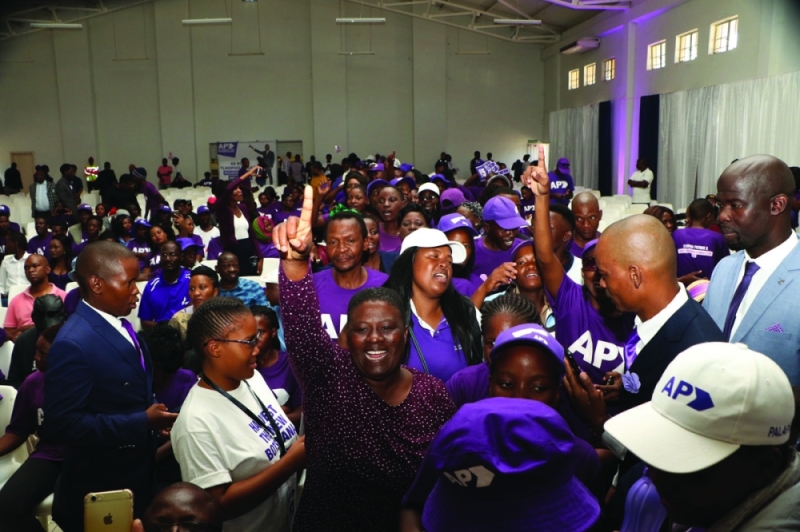AP bans lobbylists ahead of Women, Youth League meets
Tsaone Basimanebotlhe | Friday May 30, 2025 16:04


In a move aimed at curbing factionalism and promoting clean campaigns, the party has formally prohibited the use of lobby lists by individuals contesting for leadership positions. In an interview on Tuesday, the AP deputy secretary-general, Jacob Sesupo emphasised the party’s commitment to inclusivity and transparency in internal elections. He reiterated that the party does not endorse the formation or use of lobby lists, slates of candidates who campaign as a team because they have historically been known to create divisions and foster factionalism within political organisations. “We want all members to have an equal opportunity to campaign freely, without the influence or bias that comes with lobby teams,” Sesupo said. “Allowing candidates to engage with members independently fosters a spirit of unity and camaraderie. Factions are a product of lobby lists, and they have no place in a party that has just ascended to governance. We want all members to interact fairly, transparently, and respectfully,” he added.
He said the upcoming congresses are especially significant, coming at a critical juncture following the AP’s recent victory in the national elections. With new found responsibilities and increased scrutiny, he said the party leadership is keen to present a united front and consolidate the internal structures that will drive their governance agenda forward. Sesupo emphasised that the congresses are not only a platform for leadership renewal but also an opportunity to reflect on the party’s mission and strengthen its internal democracy. He pointed out that the congress theme, ‘Transcending the AP to the next stratosphere’, is a guiding principle that calls for progress, development, and cohesion. “The congresses must serve as a turning point, where both the Women’s League and the Youth League emerge more united than ever before,” he said. “We cannot afford to behave like an opposition party when we are now entrusted with the responsibility of governance. We have a mandate to deliver, and that requires unity from within,” he highlighted. In addition to rejecting lobby lists, Sesupo explained that the party is also concerned about the negative impact of dirty campaigning, which often accompanies team-based lobbying. “We advocate for peace and clean campaigns,” he said. “We expect candidates to engage in respectful canvassing, where their ideas and vision for the party take centre stage, rather than personal attacks or smear campaigns,” he added.
When contacted for her perspective, Helen Manyaneng, the incumbent president of the AP Women’s League, echoed Sesupo’s sentiments and expressed optimism about the future. She is seeking re-election and believes that this term offers her the opportunity to fulfill goals that were previously hindered by the party's position in opposition. “In the past, things were very difficult because we lacked the resources and influence that come with being in government,” Manyaneng explained. “Now, as Deputy Speaker of the National Assembly, I have more leverage to advocate for women’s empowerment and to create strategic connections for AP women,” she said. Currently serving as the chairperson of the Parliamentary Women’s Caucus, Manyaneng highlighted her ongoing engagements with women leaders from across the continent. These interactions, she believes, will be instrumental in enriching the AP Women’s League with new ideas and tested strategies for political and social empowerment. “I frequently meet with women from different countries,” she said. “My goal is to bring some of them here to share knowledge and experiences with our women. This kind of exchange is invaluable in shaping a more effective and dynamic women’s movement within the AP,” she said. Looking to the future, Manyaneng also revealed that the Women’s League plans to advocate for electoral reforms specifically, a shift from the current First-Past-The-Post (FPTP) electoral model to a Proportional Representation System. She argued that such a change could significantly enhance the representation of women in both party and national structures. “We need structural changes that enable more women to participate in decision-making spaces,” she stated.
“A proportional representation model has the potential to increase the number of women in leadership roles, and that is something we will push for as a League,” she said. However, the race for the Women’s League presidency is not without competition. Thoko Rangswamy, who is contesting the position against Manyaneng, declined to elaborate on her vision for the League, citing ongoing campaign commitments. “At the moment, I’m deeply engaged in campaign activities and cannot comment on my plans for the League,” she said briefly. For the position of the vice president, those who will battle it out include Virginia Boingotlo and Matshidiso Morebodi. As for secretary-general, it includes Ontiretse Bogatsu and Nnana Sedabadi while for treasurer position, Gorata Molefhe will face Segopotso Keediwe.
